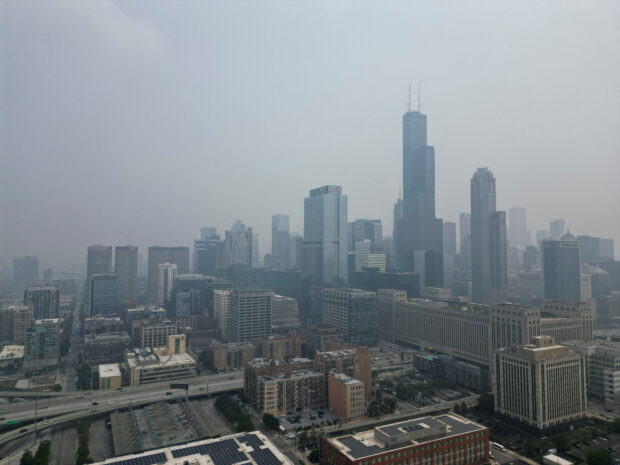Smoke hangs over US Midwest and East, hurting air quality

Haze caused by wildfires in Canada hangs over Chicago, Illinois, U.S., June 27, 2023. REUTERS/Eric Cox/File Photo
CHICAGO/WASHINGTON — Hazy, smoke-filled skies from raging Canadian wildfires hovered Wednesday over the U.S. Midwest and East, where millions of Americans were urged to limit outdoor activities as the poor air quality made for dangerous, unhealthy conditions.
Much of the Midwest – from western Iowa through Illinois and Wisconsin and into Michigan and Ohio – was under an air quality alert expected to last into Thursday or even longer, the National Weather Service said.
Air quality alerts triggered by drifting smoke from prolonged wildfires in Canada were also in effect for New York state, New Jersey, Pennsylvania, Washington, D.C. and parts of North Carolina. In all, more than 100 million Americans were dealing with poor air quality on Wednesday afternoon.
Forecasters urged people living in those areas, especially children, the elderly and those affected by respiratory illness, to limit prolonged or heavy exertion and, if possible, to stay indoors or wear a mask.
Canada is wrestling with its worst-ever start to wildfire season, which has already burned 8 million hectares (19.8 million acres), an area bigger than West Virginia. On Wednesday, there were 477 active blazes, about half which were considered out control, spread from the Pacific to the Atlantic coasts.
Article continues after this advertisementCanada’s biggest city of Toronto had the worst air of all major cities in the world on Wednesday afternoon, according to pollution tracking service IQAir.
Article continues after this advertisementAn eerie smoke-induced fog hung over Chicago, washing out the summer sun, and the air smelled of wood smoke. The city’s air quality was categorized as “very unhealthy” by AirNow.gov
By midday, the worst air quality in the United States was detected in Decatur, Illinois, about 180 miles (290 km) south of Chicago, according to AirNow, which categorized the air in the city of 70,000 as “hazardous.”
“Everyone should stay indoors and reduce activity levels,” said the government website, which tracks pollution. “Stay tuned to local news media for advisories.”
Deadly heat and high temperatures
In the U.S. South, Florida and California, high temperatures combined with high humidity were the big worry, with some 56 million people enduring stifling heat that was to persist through the weekend, the weather service said in its forecast.
The heat index – which measures how hot it feels due to the combination of humidity and temperature – was expected to climb to 100 degrees Fahrenheit (38 Celsius) and in some spots as high as 115 degrees F (46 C). The weather service urged people to seek air conditioned spaces and drink plenty of water.
Separately, Texas’ Webb County has had 11 eleven heat-related deaths in recent days. Many of those individuals had underlying health conditions and all ranged in age from 60 to 80 years old, according to the county’s medical examiner.
The county has a higher poverty rate than the state average, and the majority of residents do not have air conditioning, leaving them more exposed to the hot weather, the medical examiner told the media.